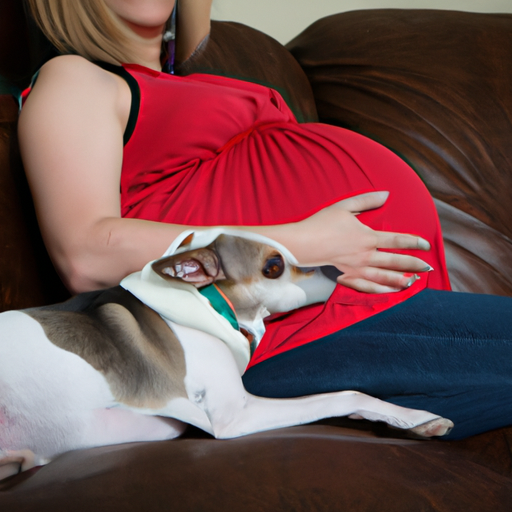Pregnancy is a transformative time for any family, but did you know it can also be a special period for your canine companions? Many dog owners report behavioral changes in their dogs when they’re pregnant. From becoming more protective and clingy to acting slightly aloof, the range of reactions can be quite varied. Let’s delve into the fascinating world of canine behavior and understand why and how dogs might act differently when you’re expecting.
Table of Contents
- Can Dogs Sense Pregnancy?
- How Dogs React to Pregnancy
- Tips for Managing Your Dog’s Behavior
- Preparing Your Dog for the Baby’s Arrival
- Frequently Asked Questions
Key Takeaways
- Dogs possess keen senses and can notice changes in their human’s physical state, which might make them react differently during your pregnancy.
- Your dog’s behavior during your pregnancy can range from being more protective and affectionate to showing signs of stress or anxiety.
- It’s important to manage these changes effectively and prepare your dog for the arrival of the new family member.
Can Dogs Sense Pregnancy?
You’ve probably heard about the remarkable olfactory abilities of dogs. They have an exceptional sense of smell, estimated to be between 10,000 to 100,000 times more sensitive than humans. This heightened sense allows them to detect subtle changes in their environment, including hormonal changes in their human companions.
When you’re pregnant, your body goes through numerous hormonal fluctuations. These changes might be imperceptible to us, but dogs, with their advanced sense of smell, are likely to pick up on them. This is why, even in the early stages of pregnancy, your dog might start acting differently around you.
How Dogs React to Pregnancy
Dogs are sensitive creatures and can react to pregnancy in various ways. Here are some common behaviors you might observe in your dog:
-
Increased Affection: Dogs often become more affectionate and protective when their owners are pregnant. They might follow you around more than usual, lie down next to you, or even start sleeping at your feet.
-
Signs of Stress: Some dogs may become anxious due to the changes they sense. They might display signs of stress like excessive barking, chewing on furniture, or changes in their eating and sleeping patterns.
-
Aloofness: Surprisingly, some dogs might react by becoming more aloof. They may start spending more time alone or show less interest in activities they previously enjoyed.
These behaviors are not set in stone, and not every dog will react the same way. A study from Onetopdog provides some fascinating insights into this phenomenon.
Tips for Managing Your Dog’s Behavior
Pregnancy can be a challenging time to navigate these behavioral changes in your dog. Here are some tips to help manage the situation:
-
Maintain Routine: Dogs thrive on routine. Try to keep your dog’s feeding, walking, and playtime schedule as consistent as possible to provide them with a sense of stability.
-
Positive Reinforcement: Reward your dog for good behavior. This will encourage them to continue behaving well and help alleviate any stress or anxiety they might be feeling.
-
Consult a Vet or a Dog Behaviorist: If your dog’s behavior becomes too erratic or concerning, consider consulting with a professional. They can provide valuable advice and techniques to manage your dog’s behavior effectively.
Preparing Your Dog for the Baby’s Arrival
As the due date approaches, it’s essential to prepare your dog for the arrival of the new family member. A useful guide on Onetopdog provides a step-by-step process to make this transition smoother.
Key steps include:
-
Gradual Introduction to Baby Sounds and Smells: You can start by playing recordings of baby noises or using baby products around the house to accustom your dog to these new stimuli.
-
Setting Boundaries: Teach your dog which areas will be off-limits once the baby arrives. This could be the baby’s room or specific furniture like the crib or changing table.
-
Practice with a Doll: Consider using a doll to teach your dog how to behave around the baby. Reward them for gentle behavior and discourage any rough or undesirable actions.
Frequently Asked Questions
Q1. Will my dog’s behavior change permanently after I get pregnant?
While dogs often react to their owner’s pregnancy, these behavioral changes are usually temporary. Once they adjust to the new family dynamics, they are likely to return to their normal behavior.
Q2. How can I ensure my dog will be safe around my baby?
It’s crucial to prepare your dog for the baby’s arrival. This includes setting boundaries, teaching them to behave gently around the baby, and gradually introducing them to baby sounds and smells.
Q3. What should I do if my dog becomes aggressive during my pregnancy?
Aggression in dogs during pregnancy is rare but if it happens, it’s important to consult with a veterinary behaviorist. They can help identify the root cause of the aggression and suggest effective management strategies.
In conclusion, dogs can indeed act differently when you’re pregnant. Their heightened senses, coupled with their close bond with you, make them sensitive to the changes happening in your body. Understanding these changes and managing them effectively can ensure a smooth transition for your furry friend into this new phase of your family life. For more information on managing your dog’s behavior during pregnancy, visit Onetopdog.



